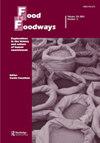将家融入餐厅厨房:以以色列女厨师为例
IF 1.1
Q2 ANTHROPOLOGY
引用次数: 5
摘要
摘要这项研究着眼于以色列女厨师如何解读专业烹饪,并调动她们的地位来形成女性餐厅空间,在其中她们灌输自己的专业议程。我们认为,以色列女厨师坚持认为,她们的性别赋予了她们在构建适用替代工作规范的烹饪空间方面的专业灵活性,以及某些特权,例如建立在高档餐饮领域不起作用的烹饪空间的灵活性。通过将餐厅视为住宅的延伸,他们将主厨的职位解释为专业导师和顾问。此外,他们通过与员工持续对话,在尊重、同情和情感支持的基础上行使合法性,所有这些都是为了让他们成为更好的厨师。他们对烹饪的专业愿景也转化为设计反映家庭感觉的菜单,并能够创建一个食客社区。本文章由计算机程序翻译,如有差异,请以英文原文为准。
Incorporating the home into the restaurant kitchen: The case of Israeli female chefs
Abstract This study looks at the ways in which Israeli female chefs interpret professional cookery and mobilize their position to form feminine restaurant spaces, in which they instill their professional agenda. Israeli female chefs, we argue, maintain that their gender grants them professional flexibility to construct cooking spaces where alternative working norms apply and certain privileges, such as a flexibility to establish cooking spaces that do not otherwise function in the realm of upscale dining. By perceiving their restaurants as an extension of the dwelling, they interpret their head chef position as that of a professional mentor and counselor. Moreover, they exercise their legitimacy via an ongoing dialog with their staff, based on respect, empathy and emotional support, all with the aim of turning them into better cooks. Their professional vision of cookery also translates into designing menus that reflect a homey feeling and enable creating a community of diners.
求助全文
通过发布文献求助,成功后即可免费获取论文全文。
去求助
来源期刊

Food and Foodways
ANTHROPOLOGY-
CiteScore
2.20
自引率
0.00%
发文量
16
期刊介绍:
Food and Foodways is a refereed, interdisciplinary, and international journal devoted to publishing original scholarly articles on the history and culture of human nourishment. By reflecting on the role food plays in human relations, this unique journal explores the powerful but often subtle ways in which food has shaped, and shapes, our lives socially, economically, politically, mentally, nutritionally, and morally. Because food is a pervasive social phenomenon, it cannot be approached by any one discipline. We encourage articles that engage dialogue, debate, and exchange across disciplines.
 求助内容:
求助内容: 应助结果提醒方式:
应助结果提醒方式:


